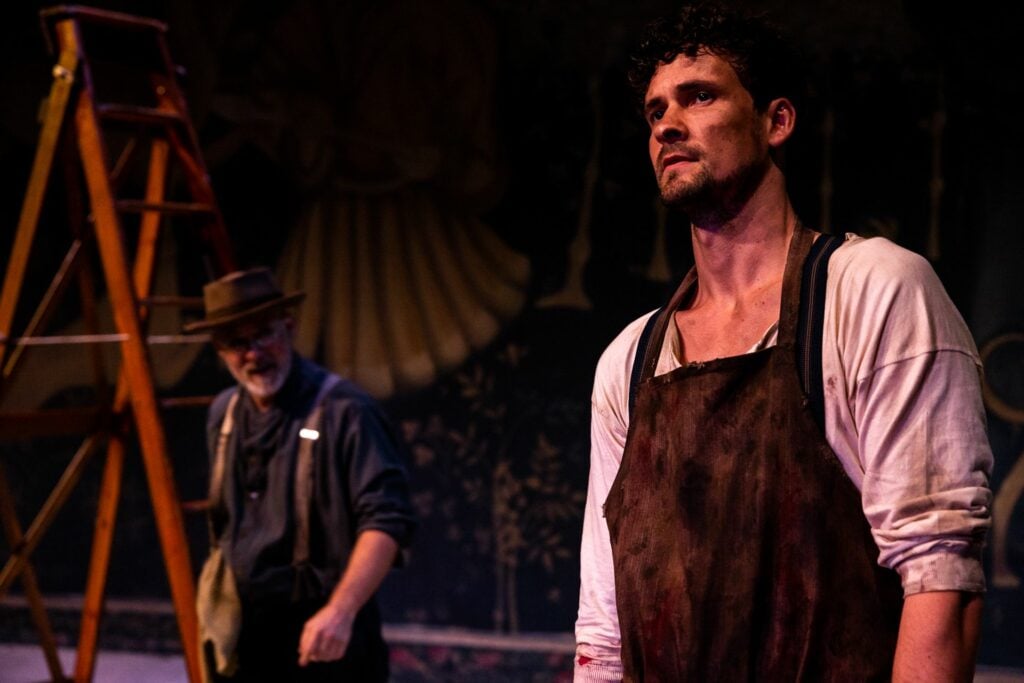
Orlando Monologue (Act 1 Scene 1)
As You Like It is arguably one of Shakespeare’s most beloved comedies, and with all of the grief of Hamlet, Ambition of Macbeth, Wit of Much Ado about Nothing and Passionate Love of Romeo & Juliet, it’s easy to understand why. One of Shakespeare’s most complex lovers is present in Orlando. And today we’re going to take a look at just what’s keeping Orlando De Boys up at night, by diving deep into the opening lines of the play. This first monologue is no doubt a challenge. It rips us into the action, and has a forward moving energy that can be unyieldy for the actor.
Updated Feb 3, 2024
Context
More important than when the play begins, is what has happened before. Orlando is the youngest son of Sir Roland De Boys, his other two sons being Oliver, the older, and Jaques the middle. They live and work in the Duchy of Duke Senior, in France, and are a part of the aristocracy and inner circle. And all seems well, as far as we know, until one day Sir Roland De Boys dies leaving his sons as soul heirs to his estate, or so he thinks. Soon after Duke Senior is usurped by his younger brother Duke Frederick and banished from the Duchy to the Forest of Arden, where he and his bestest buds must go and never come back, or die trying. Meanwhile back at Camp De Boys, Oliver, the oldest son and soul executor of his Fathers will has I fulfilled his Fathers wishes of sending Jaques to school to be educated, but has not been so generous to Orlando, instead forcing him to work in the fields, feed the animals, and overall work as peasant on their lands. Understandably this makes Orlando a little mad. Orlando knows that his Father requested in his will that he send Orlando to be educated to and is ready to take what’s rightfully his by force if he has to. In an effort to vent his frustrations and make some sense of all this he turns to his family’s servant, and his oldest friend and says…
Original Text
As I remember, Adam, it was upon this
fashion bequeathed me by will but poor a thousand
crowns, and, as thou sayst, charged my brother on his
blessing to breed me well; and there begins my sadness.
My brother Jaques he keeps at school and report speaks
goldenly of his profit. For my part, he keeps me
rustically at home or, to speak more properly, stays me
here at home unkept; for call you that keeping, for a
gentleman of my birth, that differs not from the
stalling of an ox? His horses are bred better, for besides
that they are fair with their feeding, they are taught
their manage and to that end riders dearly hired; but I,
his brother, gain nothing under him but growth, for the
which his animals on his dunghills are as much bound
to him as I. Besides this nothing that he so plentifully
gives me, the something that nature gave me his
countenance seems to take from me. He lets me feed
with his hinds, bars me the place of a brother and, as
much as in him lies, mines my gentility with my
education. This is it, Adam, that grieves me, and the
spirit of my father, which I think is within me, begins
to mutiny against this servitude. I will no longer endure
it, though yet I know no wise remedy how to avoid it.
Unfamiliar Language
But
mere
1000 crown
coin [usually showing a monarch’s crown]
English value: 5 shilllings in a crown. And 1 pound is 4 crowns.
So this is 250 pounds – in modern money $25,000 – not enough to live off.
charge
order, command, enjoin
breed
raise, bring up, support
school
old form: schoole
university
report
rumour, gossip, hearsay
profit
progress, proficiency, improvement
rustically
like a rustic, in a countrified way
unkept
neglected
goldenly
excellently, splendidly
stay
detain, confine, keep
stalling
stall accommodation, living quarters
manage
management, handling, control [especially of a horse, as a result of training]
fair
healthy, sound, fit
countenance
demeanour, bearing, manner
hinds
servant, domestic, worker, farm hands
mines
undermines, sap, subvert
place
precedence, proper place
gentility
nobility, good birth
Resources on money to help you with the first line:
Money Value in Shakespeare’s Time
Value of a Crown Shakespeare Birthplace Trust
Modern Translation
As I recall, Adam, that’s exactly why my father left me a mere thousand crowns in his will, and, as you say, commanded my brother to give his word that he would give me an education. And that is the start of my sadness.
My brother, Jaques, he has sent off to school, and by all accounts he’s flourishing from his education. But me, he keeps me at home in the country, or to be more blunt, keeps me at home neglected. For would you call this a fair way to bring up a gentleman of my birth? Whose reality differs not from how they raise cattle? His horses are raised better than me. For, besides the fact, that they are fed well, they’re taught how to behave, and they have the best trainers that money can buy.
But for me, his own brother, I gain nothing except that I grow strong from all this manual labour. For which, flies who buzz around his horse poo, are as much in-debt to him as I am. And besides this absolute nothing that he so “generously” gives me, the one thing that life gave me, he takes away from me. His whole being and cruel way of raising me, robs me of any prospect of a better life,
He makes me eat with his servants, doesn’t allow me what’s owed me as his brother, and with every chance he gets, undermines my noble status by not educating me. This is what’s upsetting me, Adam. And my fathers spirit, which I am sure is within me, is starting to rebel against this servitude. I won’t take it anymore. Although I don’t yet know how to stop it just yet.
Notes on Performance
So, as I always say, the most important thing when performing any Shakespeare monologue is understanding the context. Take a look at the brief context I’ve provided up top, and allow that to inform your performance.
Now more specifically when it comes to Orlando, understand that when we meet Orlando, he is at his worst, the beginning of the play is his rock bottom and the only way he can go is up. So allow yourself to find all of the ugly sides of this monologue and character and allow them to come through in performance.
Lastly it’s important to note that it’s implied in the script (simply in the way it’s been written) that we come into this conversation late. We’ve not heard what sparked it, and we’ll never know. But rather than letting that bring us down, we can take that as an opportunity to explore our imaginations and find our own moment before. So feel free to begin this monologue with a mountain of energy and drive!
Here’s a photo of me performing the opening monologue in my first professional production:


Leave a Reply